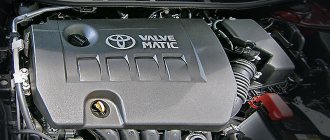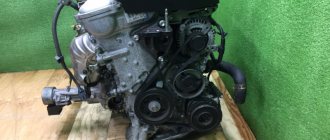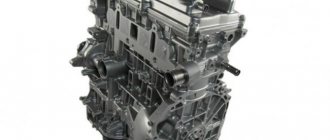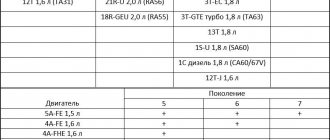Very often, buying an expensive car is not enough. Often modern technology deteriorates without proper care. This is especially true for modern foreign cars, which require careful selection of components and consumables. Due to this state of affairs, the selection of engine oil becomes a very common problem. Each car is unique in its design. Accordingly, for each engine you need to purchase fluids that are 100% compatible in terms of parameters. Otherwise, there is a risk of “damaging” the car’s engine and then spending money on expensive repairs. That is why the Toyota company produces its own brand of high-quality automobile oils - Toyota Engine Oil Synthetic 5W-40:.
Features of API SN ↑
For further understanding, it is worth clarifying the nuances of the SN category a little.
An interesting fact is that a separate classification was introduced in 2010. The difference from SM was in the small amount of phosphorus - then the latest exhaust gas neutralization systems were installed, and SN was just right for the car. Plus it was quite fuel efficient due to its good energy efficiency. Compared to its competitor, motor oil in this category also won in terms of protective properties and long service life of additives. In addition, SN is more compatible with oil seals - previously only diesel units passed this indicator. Due to compatibility, motor fuel was unified by ACEA, creating a new classification of lubricant - after all, this is a high achievement for a European car.
The API abbreviation in the subtitle stands for “American Fuels Institute”, and thanks to their classification, some categories can be mixed - so, for example, SN becomes SN/CF. The area of use is also changing - now the new motor oil can be added to diesel and gasoline engines. But the main orientation still goes to SN.
Semi-synthetic 5W30
Mitsubishi Genuine Oil SAE 5w30 lubricant mixture today can be found in two versions. Until 2015, motor oil was produced that complied with categories SM/CF (API standard), as well as GF-4 (ILSAC standard). Its original numbers are MZ320154 and MZ320153. You can find it on sale here, as we still have some left in our warehouses.
A much better quality lubricant has been produced since 2015. Its full name has not changed, but the characteristics are completely different - SN/CF, according to the API standard, as well as GF-5 according to the ILSAC classification. That is, in terms of quality indicators and additives, this is the best choice that can be in our time. Original numbers are MZ320363, MZ320757 and MZ320756.
Genuine Oil 5w30 oil base consists of mineral oil (60 to 80%) and synthetic fluid (20–40%). The mineral component is obtained by catalytic hydrocracking at high temperature and pressure. For this, various catalysts and hydrogen are used. This process ensures that the molecules are aligned along their length - that is, the long ones break, and the short ones grow together. Oil with a composition suitable for processing is used as a feedstock.
According to the API, mineral bases obtained using hydrocracking or hard hydrolytic cracking technology are classified as group 3 lubricant compositions. There are 5 of these groups in total.
The synthetic base is produced in laboratory conditions. Its synthesis is more expensive, but the result is a more homogeneous and stable component than mineral water. In addition, synthetics can be produced with predetermined characteristics and retain them over a wide range of temperatures.
Main properties of the semi-synthetic lubricant mixture:
Toyota engine oil synthetic 5w-40 oil review
- This original engine oil is universal - it can be used in both gasoline (API SN) and diesel power units (API CF).
- Performance characteristics according to the American API standard, as well as the American-Japanese ILSAC, are the highest to date; the lubricant composition is energy-saving and low-viscosity.
- The phosphorus content in the lubricant mixture is limited. The engine oil is fully compatible with the latest modifications of systems that neutralize exhaust gases.
- The highest anti-wear and anti-oxidation characteristics. Compatible with the earlier API category - SM, that is, it can be used for power units manufactured from 2004 to the present day.
- It can also be used in diesel engines with an indirect injection system. Additives included in the oil mixture prevent deposits on the surface of the pistons.
- Premature wear is reliably prevented and corrosion protection is provided for those parts that contain copper.
- Due to unique additives, there is no excessive waste of the motor oil, and the piston group is protected from soot.
- This motor oil can be used in power units that use low-quality diesel fuel with a high sulfur content, more than 0.5% of its total quantity.
Features of Toyota Engine Oil Synthetic 5W-40 API SN
What the oil is - it is a synthetic product that can be poured into gasoline and diesel engines of Toyota cars, but is also suitable for other brands of cars if the specifications are met. The oil performs well over the guaranteed mileage and ensures stable starting in winter.
Manufactured using the common hydrocracking technology. The synthetic base is supplemented with a package of additives - washing, detergent, anti-friction, anti-corrosion. It cleans the insides of the engine very gently, does not harm the oil seals of used cars, but seals them, unlike some other synthetic oils that behave more aggressively. The oil can be classified as energy-saving oil; if you follow the replacement intervals, you can achieve a sustainable reduction in fuel consumption by up to 5%.
The oil is recommended for cars with mileage over 100,000 km and from 2000, systems with turbocharging, intercooler, direct injection. Great for Japanese and Korean car brands.
Manufacturer
Many people believe that Toyota 5w40 engine oil is produced under the famous Japanese brand, but this is not entirely accurate information. It is produced by one of the main partners of the auto corporation, Exxon, with the participation of Toyota specialists. The fusion of the experience of two well-known companies in the global car market made it possible to obtain one of the best products in its segment.
The petrochemical company Exxon has been on the market for a long time, and its products are famous for their high quality, so Toyota executives entered into an agreement. Properly selected base and specially developed additives provide high-quality protection against erosion and wear of engine components and parts.
Original Japanese oil is used not only in the cars of this company; it is poured into engines of BMW, Audi, Chevrolet, Mercedes and other brands. The lubricant is produced at the company's Japanese and European factories, as indicated on the packaging.
Popular Toyota oil for gasoline engines
Nowadays, it has become very easy to purchase motor oil from a well-known Japanese manufacturer. Along with the development of the market, a large assortment of Toyota products appeared on the shelves of our supermarkets. But in order to choose the right lubricant for a car, you need to analyze all the nuances: from the used engine resource to the weather conditions of your region.
According to statistics, preference is given to Toyota 5w30 oil. This type is constantly undergoing API and ACEA standardization. Accordingly, product improvement “keeps pace” with the release of new cars. There is also a lubricant with the addition of SN. Classification “SN” - indicates energy-saving qualities, the presence of sealing impurities and additives. You can also find a mixed class of “indexation” of products, for example, SN/GF or SN/CF. The last increase means versatility in the use of oil (“GF” - for gasoline engines, and “CF” - universal for gasoline and diesel units).
I would also like to note several types of popular and high-quality Toyota oil for gasoline and diesel units:
- Premium SAE 5W-30 (SN GF) – original motor oil of the best quality. Developed according to the latest API (ILSAC) and ACEA standards. Used only for Toyota gasoline vehicles.
- Premium SAE 10W-30 – universal semi-synthetic lubricant for gasoline and diesel cars;
- Original SAE 0W-20 - intended for new (modern) engines.
- Original SAE 0W-30 – suitable for all types of new engines.
- Original SAE 5W-40 is a viscous oil. Has excellent lubricating properties. Ensures reliable engine operation over a wide temperature range.
- Original SAE 0W-20 - has high fluidity, intended for Toyota cars. Use only according to the manufacturer's recommendations.
Toyota 5w30 GF-5 oil
Of course, the “TOP” type, which has hundreds of thousands of positive reviews, is considered to be Toyota 5w30 sn gf 5 oil for a gasoline unit. Its characteristics suit almost all the needs of our consumer. You can find more detailed information about this type of product in this topic.
Toyota engine oil fuel economy 5w30
How to choose the right auto parts
Advantages and disadvantages
The benefits of the oil are undeniable:
- extreme loads do not affect the stability of the engine when using Toyota engine oil;
- high alkaline index ensures cleaning of engine elements and components;
- the oil fully complies with all known environmental and safety standards;
- deposits, corrosion - all this is prevented through the use of oil;
- thanks to the polyalphaolefins included in the composition, fuel consumption is reduced by 4-5 percent;
- A cold start is literally not felt by the driver. Everything happens smoothly, exactly down to minus 42 degrees.
Main properties and characteristics
Due to the nature of their design, relatively new Mitsubishi engines require low-viscosity lubricants. This is due to several factors.
- If the power unit is less than 5 years old, its design is such that it produces more power per unit volume. This effect is achieved in various ways - installing turbochargers, increasing the number of valves, increasing compression for more complete combustion of fuel. This means that the gaps between the parts of such engines are minimal.
- If the motor is not worn out, the gaps between its parts have not yet increased. A viscous lubricant cannot cope with the task of forming a thin lubricating film, so its use leads to rupture of such films. As a result, many "narrow" contact areas may run dry. The consequences are easy to predict.
Therefore, Mitsubishi 0w30 oil is intended for the latest generation engines running on gasoline. It contains additives that can best protect Mitsubishi engines from premature wear. Suitable for power units of such models as Outlander, Pajero, Lancer. It is not recommended to pour such lubricant into old cars - not only because of the low viscosity, which will lead to a lot of waste. Active additives can damage the material of oil seals, as well as other seals made using outdated technologies.
The level of low-temperature viscosity allows you to start the engine without problems even in 30-degree frost. Tests have shown that the oil fluid retains very good fluidity, preventing the engine from starving of oil. In general, motor oil of this brand is suitable for all new engines produced in Mitsubishi, if their volume does not exceed 2.4 liters. The manufacturer claims that this engine oil can save up to 6% fuel. This is quite likely, given the category that is assigned to it in the API specification - SM. According to the ILSAC classification, the characteristics correspond to GF-4.
Among the main advantages of Japanese lubricant are the following:
- the presence in the additive package of friction modifiers that determine antifriction qualities;
- anti-wear additives can significantly extend the life of the engine;
- anti-corrosion components help preserve the metal surfaces of parts;
- detergent and dispersant additions help keep the engine clean by removing carbon deposits from it, along with various types of deposits;
- good thermal conductivity allows you to effectively remove heat from the piston group, which is most susceptible to heating;
- high permeability allows you to create a protective film in the most inaccessible engine mechanisms.
Technical characteristics, tolerances, specifications
| Complies with class | Explanation of the designation |
| API SN/SM/CF | SN is the quality standard for automobile oils since 2010. These are the latest stringent requirements; oils certified according to the SN standard can be used in all modern generation gasoline engines manufactured in 2010. SM – for cars from 2003. It has the best indicators of protection, environmental friendliness and energy saving. CF is a quality standard for diesel engines, introduced in 1994. Oils for off-road vehicles, engines with split injection, including those running on fuel with a sulfur content of 0.5% by weight and higher. Replaces CD oils. |
| ACEA A3/B4 | ACEA oil classification. Until 2004 there were 2 classes. A – for petrol, B – for diesel. Then they were combined A1/B1, A3/B3, A3/B4 and A5/B5. The higher the ACEA category number, the more stringent the requirements the oil meets. |
Laboratory tests
| Index | Value/Unit |
| — | |
| 13.52 mm²/s | |
| 80.08 mm²/s | |
| — | |
| — | |
| 173 | |
| -44°C | |
| 231°C | |
| 1.21% wt. | |
| SN/SM/CF | |
| A3/B4 | |
| 10.36 mg. KOH per 1 g | |
| 1.79 mg. KOH per 1 g | |
| 0.283% | |
| Fourier IR Spectrum | Based on VHVI+possibly a little PAO (equal to synthetics) |
| — |
Test results
Oil tests showed that ExxonMobil, as always, is at its best, everything was done exactly according to the recipe. The viscosity of the oil is low, that is, it is really economical, although under high load this can be a disadvantage. The alkaline number is high, while the acid number, on the contrary, is very low, that is, the oil has high cleaning properties and works throughout the entire recommended mileage.
There is little ash, which corresponds to the standard of modern oils. Stable at high temperatures, as indicated by flash point. Sera is normal. But the pour point is really surprising: -44 degrees, for 5W-40 this is a good indicator. The additive package is quite standard, but functional.
Petro-Canada supreme synthetic 5w-30 oil: characteristics, reviews
Release form and articles
- 08880-80835 — Toyota Engine Oil Synthetic 5W-40 5L
- 08880-80836 — Toyota Engine Oil Synthetic 5W-40 1L
- 08880-80375GO - Toyota Engine Oil Synthetic 5W-40 5L
- 08880-80376GO- Toyota Engine Oil Synthetic 5W-40 1L
Advantages
- Perfectly combined with used engines.
- Be careful with rubber parts.
- Fuel economy.
- Exact adherence to the recipe.
- High cleaning properties.
- Maintains performance throughout the entire recommended mileage.
- Easy start in cold weather.
Flaws
Relatively low kinetic viscosity.
Specifications
The product of a 5-year study of the composition and properties of lubricants gave high stability indicators and liquid parameters.
Toyota 5W40 synthetic motor oil has the following characteristics:
| Index | Meaning |
| SAE Specification | 5W40 |
| Density at +15°C | 0.850g/cm3 |
| Viscosity at +40°C | 83.7 mm2/s |
| Viscosity at +100°C | 14.2 mm2/s |
| Viscosity at -30°C | 5870 MPa/s |
| Viscosity index | 175 |
| Ash content | 1.02% mass |
| Base number | 11.0 mg KOH/g |
| Pour point | -39 ºС |
| Flash point | +220 ºС |
| Manufacturer country | France |
Application area
Toyota 0W30 oil has the following type of specifications and technical characteristics:
- API SL/CF. According to the classification of the American Petroleum Institute, the oil is suitable for cars with diesel engines after 2000, as well as units with indirect injection, turbocharger, compressor.
- ACEA A3/B3/B In turn, the classification of the Association of European Automobile Manufacturers recommends the liquid for use by owners of passenger cars, light-duty vehicles, with injection, pump injectors, turbocharging or without it. And also for cars that are not sensitive to the quality of the fuel they fill.
- SAE 0W-30. This indicator was created by the Society of Automotive Engineers. According to their type, this oil is all-season.
Verdict
An excellent branded oil, made exactly according to the recipe. Economical and efficient, fights deposits well, and ensures stable engine starting in cold weather. I am especially pleased with the careful handling of oil with the oil seals of used cars; you can safely pour it without fear of leakage.
The only thing that personally bothers me about this oil is its rather low kinetic viscosity. It fits into the SAE J300 standard, the oil may be called 5W-40, but such a viscosity may not provide a sufficiently strong film under high loads, but it saves fuel. If you use a car in extreme conditions, you should think about whether to pour it or not to pour it. For normal conditions of use, the oil is optimal in all respects.
How to spot a fake
The main parameters by which you can identify the original Toyota 5W-40 oil.
- The product is supplied in canisters made of thick, gray plastic. The container has a smooth surface, the joints are neatly made and hardly noticeable.
- The sticker is applied evenly and firmly. The presence of blots, typos or grammatical errors is unacceptable. The printing quality is also high.
- Mandatory indication of the country of manufacture (imprint on the body of the canister).
- Presence of engraving on the cork.
Application area
Toyota Fuel Economy 5W30 has approvals from the American Petroleum Institute SJ, SL/CF, CF and the European Association of Automobile Manufacturers A1-B1, A5-B5, A1, B1.
According to the first standard, this is oil for gasoline engines produced since 1980.
The second standard, Toyota Engine Oil 5W30, speaks of the possibility of using the liquid in diesel and gasoline engines, including highly accelerated ones, which require the use of friction-reducing oils.
Other Toyto oils with similar characteristics and viscosity:
- TOYOTA Premium Fuel Economy C2 SN 5W-30;
- Toyota Motor Oil 5W-30 SN/GF-5.
Tolerances, specifications and approvals
All Toyota oils comply with generally accepted international quality standards. Engine Oil Synthetic 5W-40 lubricant has the following approvals:
- American Petroleum Institute or API specification. The SL category means that the lubricant is approved for use in American-made gasoline and diesel units.
- ACEA A1/B1 A5/B5 specification allows the lubricant to be used on all types of diesel and gasoline units.
Separately, it must be said that oil testing at the Toyota plant is carried out in the most stringent manner. For tests, real motors are taken and the procedures are performed under conditions as close as possible to real ones. In this way, the company achieves the highest levels of quality and efficiency.
Application
Toyota Engine Oil Synthetic 5W-40 is recommended for use in all types of power plants. Compliance tests were carried out with gasoline, diesel and gas engines of passenger cars and light trucks. The lubricant also shows sufficient compatibility with turbocharging and direct injection systems.
The formula has proven to be most effective on engines with a mileage of more than 150 thousand kilometers. Cars that entered service after 2000.
Such efficiency indicators are achieved by gently cleaning engine parts from contaminants, which is very important for seasoned cars. In case of more aggressive behavior of detergent additives, there is a possibility of damage to the installation due to the detachment of large pieces
This is fraught with blocking of oil lines and starvation of some parts.
Also, the lubricant is not compatible with exhaust gas treatment systems.
Analogs
You can replace Toyota Synthetic 5W-40 engine oil with the following lubricants:
- REPSOL Elite Competicion 5W-40;
- MORRIS LUBRICANTS Multivis CST HP 5W-40;
- RAVENOL HST 5W-40;
- VW Special G 5W-40;
- PETRO-CANADA Europe Synthetic 5W-40;
- CASTROL Edge 5W-40;
- IDEMITSU Zepro Euro Spec 5W-40;
- RAVENOL VMO 5W-40;
- RAVENOL VST 5W-40;
- ARAL High Tronic 5W-40;
- VALVOLINE SynPower MST 5W-40 C3;
- VALVOLINE SynPower 5W-40;
- SELENIA WR 5W-40;
- ADDINOL Premium 0540 C3 SAE 5W-40;
- BARDAHL XTEC 5W-40;
- SHELL Helix Ultra L 5W-40;
- SHELL Helix Ultra Diesel L 5W-40;
- MOTOREX Select SP-X 5W-40;
- MOTOREX Topaz 5W-40;
- CASTROL Edge 5W-40 A3/B4.
A little about the oil of the Japanese concern
The Toyota brand offers a wide range of products for lubricating power units. The fluids are intended for use in gasoline and diesel engines and are of high quality. Specialists from the Japanese automaker take part in the development of lubricants, and their production is carried out by the well-known corporation Exxon Mobil. Motor oil (MO) undergoes multi-stage testing. Tests are carried out in modes that are as close as possible to the operating conditions of the equipment. Unlike compounds produced by European companies, Toyota oil is tested by both the American Petroleum Institute (for compliance with API standards) and the European Automobile Manufacturers Association (according to the ACEA classification). Thus, lubricating fluids are approved for use in vehicle engines produced by various factories.
The manufacturer offers several types of technical fluids. The most popular synthetic lubricant is SN/GF-5. It is produced from crude oil using catalytic hydrocracking. After manufacturing the base, a package of additives is added to it, which gives the finished product excellent performance characteristics. Oil belongs to the third group of technical fluids. Despite the fact that it is essentially a semi-synthetic product, its properties allow the liquid to be classified as “Synthetics”.
Toyota 5W30 engine oil is produced in factories located in Japan, as well as in Europe and North America.
Scope of application of the liquid
The characteristics of Toyota 5W30 lubricant allow it to be used in power units of many vehicles.
Engine oil suitable for:
- engines running on gasoline and diesel fuel;
- passenger vehicles and small trucks;
- atmospheric engines and internal combustion engines equipped with turbines;
- cars with catalysts and particulate filter elements (DPF) installed in the exhaust system.
Toyota 5W30 engine oil is not used in power units that were specially designed to operate on energy-saving 0W20 lubricants.
The MM replacement interval in naturally aspirated gasoline units is 10 thousand km, in turbocharged engines – 5 thousand km.
Characteristics of Toyota 5W30 engine oil
The use of innovative technologies and high-quality ingredients in the production of lubricants allows the finished product to be endowed with excellent performance properties.
What characterizes lubricant from Toyota:
- excellent lubricity, which minimizes wear of engine parts and components;
- the presence of components that prevent corrosion phenomena;
- excellent cleaning ability, which allows you to remove contaminants generated during operation of the equipment (flushing the power unit when changing the oil is not required);
- good sealing properties that protect seals and gaskets;
- energy efficiency that helps save fuel;
- stability of characteristics throughout the entire operational period.
It is worth noting that MM is perfectly adapted to domestic fuel, which is not always of high quality. Toyota 5W30 oil is best characterized by consumer reviews. Most of those who have tried a lubricant at work do not change it in the future.
Price range and sales locations
Prices for Toyota 5w40 engine oil vary depending on the seller’s appetites. As usual, the product costs more in retail chains, and cheaper in online stores. When purchasing, you should focus on the average price of 2,500 rubles for 5 liters and 600 rubles for 1 liter. Some sites offer prices starting from 1,500 rubles, but this policy is suspicious. It is better to focus on sellers with a product cost above 2000 rubles.
You can find the product in online stores using the article number or at any off-line specialized point of sale. You can find out how much a product costs using the contact details of the trading platform.
Product Description
Toyota 0W30 is an amber-colored synthetic oil designed for modern diesel and gasoline cars manufactured under the Toyota and Lexus brands. The basis is hydrocracking, with the addition of low-sulfur additives.
Thanks to the low viscosity of Toyota 0W-30, the car also begins to consume less energy to start. Accordingly, fuel consumption and emissions are reduced in proportion to the above. During a cold start, the car engine is always insufficiently lubricated, however, the viscosity-temperature characteristics of the oil fluid make it possible to avoid this problem.
Toyota 0W-30 is produced in plastic or iron cans with a volume of 1 and 5 liters.
Product Description
Toyota Synthetic 5W40 lubricant is a first-class product made in Europe. A unique formula, a meticulous approach to production technology. All this gives excellent results in the quality and durability of the lubricant.
Performance properties allow the liquid to be used in different climatic conditions. Viscosity indicators remain at nominal values in cold and heat. And thanks to the thorough preparation of the initial bouquet of oils and the progressive technology of flagship additives, the lubricant has high lubricating and washing properties.
It is also worth mentioning the cleaning performance of the liquid. The presence of special components allows you to effectively combat old stains. And oxidation resistance prevents the formation of corrosion and new deposits inside the power unit.
An additional factor influencing quality is the presence of our own testing site. The company tests all products in real conditions. Only after successful completion of tests the product is released into mass production.
This approach allows engineers to refine the composition as much as possible. And get decent results at the end.
What does 5W40 stand for?
The SAE specification determines which viscosity class a given lubricant can be classified into. Thanks to this parameter, the possibility of using the lubricant in specific weather conditions is established.
In this case, the decoding of the 5W40 index looks like this.
- The first digit determines the minus threshold for oil operation.
- The letter “W” indicates the possibility of using the product in winter.
- The second part of the index shows the limit of the maximum temperature suitable for operation.
Thus, the grease can be used at temperatures from -30°C to +40°C.










